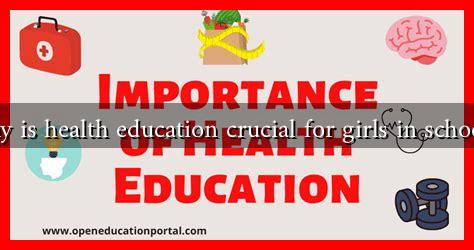-
Table of Contents
Why is Health Education Crucial for Girls in Schools?
Health education is a vital component of the school curriculum, particularly for girls. As they navigate the complexities of adolescence, girls face unique health challenges that can significantly impact their physical, emotional, and social well-being. This article explores the importance of health education for girls in schools, highlighting its role in empowering them to make informed decisions about their health and future.
The Importance of Health Education
Health education encompasses a wide range of topics, including nutrition, mental health, reproductive health, and disease prevention. For girls, understanding these subjects is crucial for several reasons:
- Empowerment: Health education empowers girls to take control of their bodies and make informed choices.
- Awareness: It raises awareness about health issues that disproportionately affect women, such as reproductive health and mental health disorders.
- Prevention: Education can lead to better health outcomes by promoting preventive measures and healthy behaviors.
Addressing Unique Health Challenges
Girls face specific health challenges that necessitate targeted education. For instance, menstruation, pregnancy, and mental health issues are areas where girls often lack adequate information. According to the World Health Organization (WHO), approximately 1 in 4 girls experience mental health issues during adolescence. Health education can help address these challenges by providing:
- Menstrual Health Education: Teaching girls about menstrual hygiene management can reduce stigma and improve health outcomes.
- Reproductive Health Knowledge: Understanding reproductive health can help prevent unintended pregnancies and sexually transmitted infections (STIs).
- Mental Health Awareness: Education can help girls recognize the signs of mental health issues and seek help when needed.
Case Studies and Statistics
Numerous studies have demonstrated the positive impact of health education on girls’ health outcomes. For example, a study published in the Journal of Adolescent Health found that girls who received comprehensive health education were more likely to engage in healthy behaviors, such as regular exercise and balanced nutrition. Additionally, a report from the United Nations Educational, Scientific and Cultural Organization (UNESCO) indicated that girls who receive health education are less likely to drop out of school due to health-related issues.
Furthermore, a survey conducted by the Global Education Monitoring Report revealed that girls who receive health education are 50% more likely to seek medical help when needed compared to those who do not. This statistic underscores the importance of equipping girls with the knowledge they need to advocate for their health.
Creating Supportive Environments
For health education to be effective, schools must create supportive environments that encourage open discussions about health topics. This can be achieved through:
- Training Educators: Teachers should receive training on how to deliver health education effectively and sensitively.
- Involving Parents: Engaging parents in health education initiatives can reinforce learning at home.
- Peer Education Programs: Implementing peer-led programs can create a safe space for girls to discuss health issues.
Conclusion
Health education is crucial for girls in schools as it empowers them to make informed decisions about their health and well-being. By addressing unique health challenges, providing relevant information, and creating supportive environments, schools can play a pivotal role in shaping the future of girls. As we continue to advocate for comprehensive health education, it is essential to recognize its potential to transform lives and promote gender equality. Investing in girls’ health education is not just a moral imperative; it is a strategic investment in the future of our societies.

